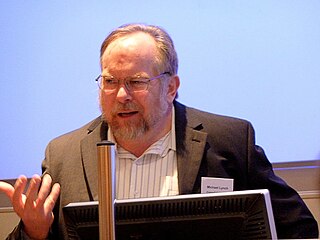Related Research Articles

Discourse is a generalization of the notion of a conversation to any form of communication. Discourse is a major topic in social theory, with work spanning fields such as sociology, anthropology, continental philosophy, and discourse analysis. Following pioneering work by Michel Foucault, these fields view discourse as a system of thought, knowledge, or communication that constructs our world experience. Since control of discourse amounts to control of how the world is perceived, social theory often studies discourse as a window into power. Within theoretical linguistics, discourse is understood more narrowly as linguistic information exchange and was one of the major motivations for the framework of dynamic semantics. In these expressions, ' denotations are equated with their ability to update a discourse context.

Social constructionism is a term used in sociology, social ontology, and communication theory. The term can serve somewhat different functions in each field; however, the foundation of this theoretical framework suggests various facets of social reality—such as concepts, beliefs, norms, and values—are formed through continuous interactions and negotiations among society's members, rather than empirical observation of physical reality. The theory of social constructionism posits that much of what individuals perceive as 'reality' is actually the outcome of a dynamic process of construction influenced by social conventions and structures.

Conversation analysis (CA) is an approach to the study of social interaction that empirically investigates the mechanisms by which humans achieve mutual understanding. It focuses on both verbal and non-verbal conduct, especially in situations of everyday life. CA originated as a sociological method, but has since spread to other fields. CA began with a focus on casual conversation, but its methods were subsequently adapted to embrace more task- and institution-centered interactions, such as those occurring in doctors' offices, courts, law enforcement, helplines, educational settings, and the mass media, and focus on multimodal and nonverbal activity in interaction, including gaze, body movement and gesture. As a consequence, the term conversation analysis has become something of a misnomer, but it has continued as a term for a distinctive and successful approach to the analysis of interactions. CA and ethnomethodology are sometimes considered one field and referred to as EMCA.

Transfeminism, or trans feminism, is a branch of feminism focused on transgender women and informed by transgender studies. Transfeminism focuses on the effects of transmisogyny and patriarchy on trans women. It is related to the broader field of queer theory. The term was popularized by Emi Koyama in The Transfeminist Manifesto.
Discursive psychology (DP) is a form of discourse analysis that focuses on psychological themes in talk, text, and images.

Jonathan Potter is a British psychologist and Dean of the School of Communication and Information at Rutgers University. He is one of the pioneers of discursive psychology.

Discourse analysis (DA), or discourse studies, is an approach to the analysis of written, spoken, or sign language, including any significant semiotic event.
Margaret Wetherell is a prominent academic in the area of discourse analysis.
Research into the many possible relationships, intersections and tensions between language and gender is diverse. It crosses disciplinary boundaries, and, as a bare minimum, could be said to encompass work notionally housed within applied linguistics, linguistic anthropology, conversation analysis, cultural studies, feminist media studies, feminist psychology, gender studies, interactional sociolinguistics, linguistics, mediated stylistics, sociolinguistics, and feminist language reform and media studies.
Alexa Hepburn is professor of communication at Rutgers University, and honorary professor in conversation analysis in the Social Sciences Department at Loughborough University.

Rhetoric of therapy is a concept coined by American academic Dana L. Cloud to describe "a set of political and cultural discourses that have adopted psychotherapy's lexicon—the conservative language of healing, coping, adaptation, and restoration of previously existing order—but in contexts of social and political conflict".

Michael E. Lynch, is an emeritus professor at the department of Science and Technology Studies at Cornell University. His works are particularly concerned with ethnomethodological approaches in science studies. Much of his research has addressed the role of visual representation in scientific practice.
The social construction of gender is a theory in the humanities and social sciences about the manifestation of cultural origins, mechanisms, and corollaries of gender perception and expression in the context of interpersonal and group social interaction. Specifically, the social construction of gender theory stipulates that gender roles are an achieved "status" in a social environment, which implicitly and explicitly categorize people and therefore motivate social behaviors.

Rosalind Clair Gill is a British sociologist and feminist cultural theorist. She is currently Professor of Social and Cultural Analysis at City, University of London. Gill is author or editor of ten books, and numerous articles and chapters, and her work has been translated into Chinese, German, Portuguese, Spanish and Turkish.
Feminist post-structuralist discourse analysis (FPDA) is a method of discourse analysis based on Chris Weedon's theories of feminist post-structuralism, and developed as a method of analysis by Judith Baxter in 2003. FPDA is based on a combination of feminism and post-structuralism. While it is still evolving as a methodology, FPDA has been used by a range of international scholars of gender and language to analyse texts such as: classroom discourse, teenage girls' conversation, and media representations of gender. FPDA is an approach to analysing the discourse of spoken interaction principally.
Feminist metaphysics aims to question how inquiries and answers in the field of metaphysics have supported sexism. Feminist metaphysics overlaps with fields such as the philosophy of mind and philosophy of self. Feminist metaphysicians such as Sally Haslanger, Ásta, and Judith Butler have sought to explain the nature of gender in the interest of advancing feminist goals.

Elizabeth Stokoe is a British social scientist and conversation analyst. Since January 2023, she has been Professor in the Department of Psychological and Behavioural Science at The London School of Economics and Political Science. She was previously Professor of Social Interaction at Loughborough University (2002–2022) in the Discourse and Rhetoric Group, where she remains an Honorary Professor. She has been Professor II at University of South-Eastern Norway since 2016.
Bethan Benwell, is a British linguist. She has been a senior lecturer in English Language and Linguistics, for the Division of Literature and Languages, at the University of Stirling since 2008.

Judith Baxter was a British sociolinguist and Professor of Applied linguistics at Aston University where she specialised in Gender and Language, and Leadership Language. She served in editorial positions with several academic journals.
Positioning theory is a theory in social psychology that characterizes interactions between individuals. "Position" can be defined as an alterable collection of beliefs of an individual with regards to their rights, duties, and obligations. "Positioning" is the mechanism through which roles are assigned or denied, either to oneself or others. The theory describes malleable roles and storylines that determine the boundaries of future acts and the meanings of what people say and do. The theory expands upon the work of psychologist Lev Vygotsky, especially his theory of zone of proximal development (ZPD). It emphasizes the interdependence of positions, speech and other acts, and storylines that arise from them; a change in any one aspect affects the other two. The theory provides a framework to understand a person's specific behavior by considering social, individual, and moral factors.
References
- ↑ Wetherell, Margaret (2009), "List of contributors xiii", in Wetherell, Margaret (ed.), Theorizing identities and social action, Identity Studies in the Social Sciences, Houndmills, Basingstoke, Hampshire England New York: Palgrave Macmillan, p. xiii, ISBN 9780230580886.
- ↑ Freed, Alice; Ehrlich, Susan (2010), "Contributors", in Freed, Alice; Ehrlich, Susan (eds.), Why do you ask? the function of questions in institutional discourse, Oxford New York: Oxford University Press, p. xiv, ISBN 9780195306903.